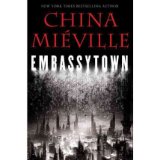Embassytown by China Mieville, Reviewed
China Mieville has built a whole career on writing novels that blur genres. Embassytown, his first unequivocal venture into SF, takes the reader to a city on the edge of the universe.
Avice Banner Cho is an immerser, a traveller on the sea of space and time below the everyday, now returned to her homeworld. Here on Arieka, humans are not the only intelligent life, and Avice has a rare bond with the natives, the enigmatic Hosts – who cannot lie.
Only a tiny cadre of unique human Ambassadors can speak Language to the Hosts, and connect the two communities. Then an alien learns haltingly to lie, and is killed by both sides. Hard on the heels of that devekopment, an unimaginable new arrival comes to Embassytown. And when this new Ambassador speaks, everything changes. Catastrophe looms. Avice knows the only hope is for her to speak directly to the alien Hosts. And that’s impossible.
Mieville examines in some detail concepts behind language, in an attempt to create some truly alien aliens – this is something that writers such as Benford have spent years grappling with – and manages to do so without infodumping, using a text packed with neologisms that are just about comprehensible, such as autom and artminds – although floaking eluded me. It’s as if we can only understand one another through a mutual misunderstanding. (p.114)
Mieville dissects both the limitations of language, and the potentialities inherent in something we take for granted, such as a lie. ‘They were yanking it around,’ Bren said. ‘It was impossible for it not to know what they meant; they were shoving it and pointing the same way. They made it obey them. Maybe you need violence for language to take.’
‘Bren,’ I said. ‘That’s crap. We were all running the same way. We were all trying to get out. We had the same intentions. That’s how it knew what we were doing.’
He shook his head. ‘Language` is the continuation of coercion by other means.’ ‘Bullshit. It’s co-operation.’ Both theories explained what had happened plausibly. I resisted, because it felt trite , saying that they weren’t as contradictory as they sounded. (p.454)
Mieville’s characters live in this future, rather than tell us about it, in the same way that major novelists such as Beryl Bainbridge have their characters inhabit the past, rather than lecture their readers, or contemporary novelists just get on with life. Who has time to stop and explain an iPod or a netbook to a stranger?
He demonstrates through such actions such as children’s games (who can run furthest into the alien atmosphere, leave a mark and return) and behaviour at parties (checking on acquaintances bios online) just how it feels to live on this world.
I haven’t felt such a sense of how different -but still [just] comprehensible the future will be since reading Greg Bear’s Queen of Angels almost two decades ago.
The downside for some readers is that it demands far greater concentration to understand what is going on, something that many will not care for. But for those prepared to make the effort, Embassytown is well worth the investment. It also nails any idea that writing fantasy has been a soft option for a writer who couldn’t cope with writing proper SF. It’ll be on the Nebula Ballot at the end of this year, or a major injustice will have been done.
Leave a Reply
Warning: Undefined variable $user_ID in /usr/home/wtpress/public_html/harvey/wp-content/themes/colin-harvey-theme/comments.php on line 60
You must be logged in to post a comment.
